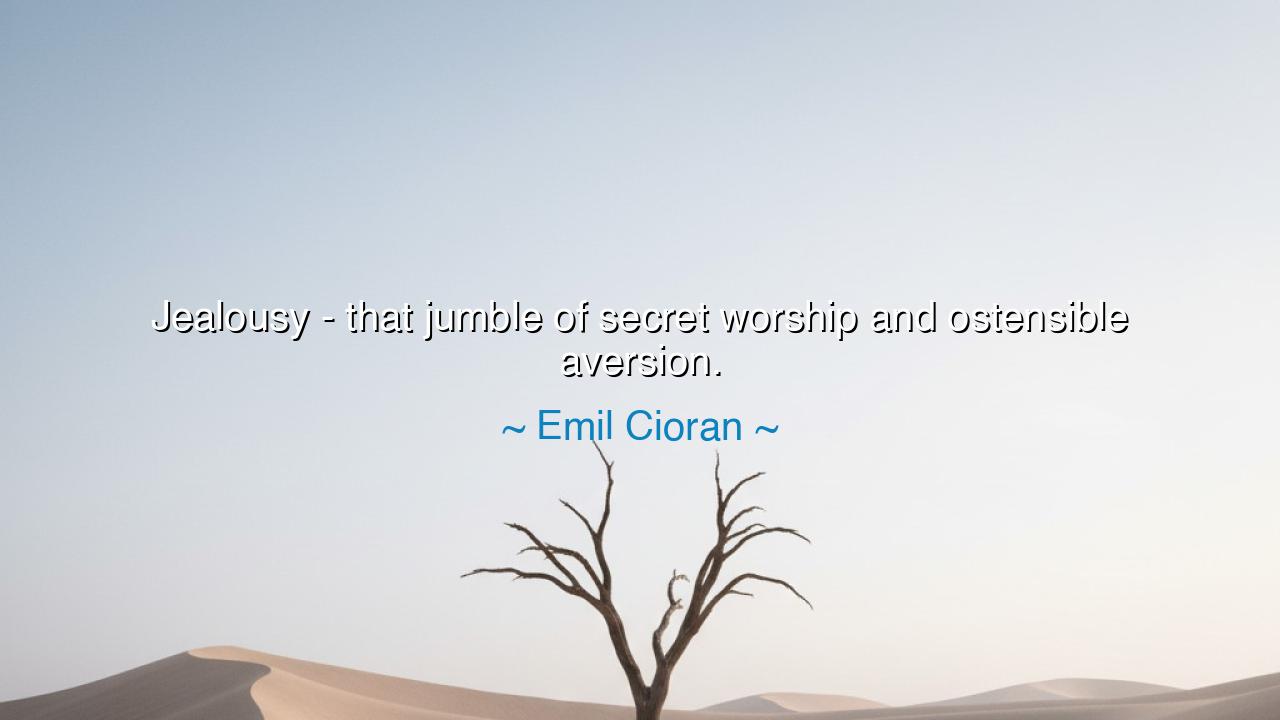
Jealousy - that jumble of secret worship and ostensible aversion.






“Jealousy — that jumble of secret worship and ostensible aversion.” Thus wrote Emil Cioran, the philosopher of shadows, the poet of despair, whose words often pierced through the illusions of the human heart like a blade of cold reason. In this haunting phrase, he reveals the paradox that lies at the very core of jealousy — that it is both admiration and hatred, worship and aversion, tangled together in the same breath. The jealous soul, he tells us, both reveres and despises the object of its envy; it cannot decide whether to kneel or to strike. It bows in secret adoration while cursing aloud in bitterness. For jealousy, in its truest form, is love corrupted by comparison — the heart’s devotion twisted into torment.
Cioran, born amidst the mountains of Romania and later wandering through the solitude of Paris, was a man who studied the contradictions of the soul. He knew that emotion is never pure — that love carries the seed of pain, and that envy wears the mask of disdain to conceal its own longing. When he calls jealousy a “jumble,” he captures this turmoil perfectly. It is the storm of the heart that both admires and resents another’s light. We hate those who remind us of our incompleteness, yet secretly, we worship them for possessing what we desire. Thus, jealousy is not born of hatred, but of unfulfilled love — love that has lost its direction and turned inward to poison itself.
The ancient Greeks, masters of human truth, understood this dual nature well. They told the story of Apollo and Hyacinthus, a tale both divine and tragic. Apollo loved the youth with all the ardor of the sun, yet when the wind-god Zephyrus grew jealous of their closeness, he sent a fatal gust that turned Apollo’s discus against the boy he loved. In his jealousy, Zephyrus destroyed the very thing he adored, unable to bear his own longing. And so it is with us — our envy often harms not the one we claim to despise, but the one we unconsciously worship. For jealousy, as Cioran says, is never simple hatred; it is admiration turned sour, reverence tainted by pain.
In the modern world, too, this truth stands unchanged. Consider the rivalry between Wolfgang Amadeus Mozart and Antonio Salieri — immortalized in the whispers of history and the art of story. Salieri, a respected composer, admired Mozart’s genius deeply, even called it divine. Yet his admiration turned to resentment as he realized he could never reach such effortless brilliance. In secret, he both praised and cursed the younger man, torn between worship and aversion. His jealousy consumed him — and in that consuming, his music dimmed while Mozart’s shone all the brighter. This is the essence of Cioran’s thought: that jealousy is the agony of loving another’s greatness while despising our own lack of it.
Cioran’s insight is not merely an observation of emotion but a diagnosis of the human condition. He saw that jealousy arises when we seek in others what we have not yet found within ourselves. The jealous heart cries, “I want what they have!” — yet deeper still, it whispers, “I wish I could be what they are.” It is the wounded cry of the soul that has forgotten its own worth. The “secret worship” he describes is the recognition, however painful, of another’s beauty, brilliance, or strength — and the “ostensible aversion” is the mask we wear to hide that recognition. We scorn what we cannot yet embrace, and we curse what secretly inspires us.
But this paradox, though bitter, holds the seed of transformation. For if we can look upon our jealousy not with shame but with understanding, we may uncover its hidden purpose. Jealousy, when faced with honesty, reveals what we truly desire. It shows us the qualities we admire but have not yet claimed as our own. Instead of letting that energy curdle into resentment, we can let it become aspiration — a worship that builds rather than destroys. The wise do not deny jealousy; they transmute it. They turn comparison into creation, envy into effort, admiration into inspiration.
So, my listener, remember this: when jealousy stirs in your heart, do not let it make you small. Do not hide behind the mask of scorn or feed the fire of self-loathing. Ask instead, “What does this emotion reveal about my longing?” If you find yourself secretly admiring what you pretend to despise, know that the soul is speaking through jealousy, urging you toward growth. Transform your aversion into action, your worship into will. Learn from what you envy, and soon, you will no longer envy at all.
For in the end, Emil Cioran reminds us that jealousy is a mirror — cracked, distorted, but honest. It shows us not the weakness of others, but the places within ourselves still waiting to be filled with light. Do not shatter the mirror in anger; polish it in wisdom. Look deeply, and you will see that what you once envied in another was always a reflection of what your soul was yearning to become.






AAdministratorAdministrator
Welcome, honored guests. Please leave a comment, we will respond soon